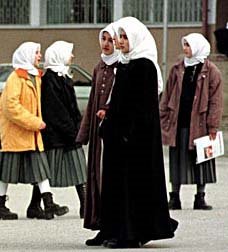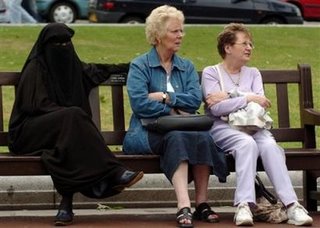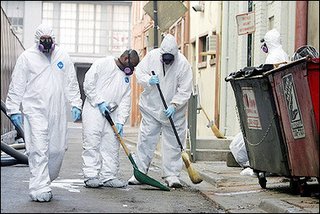As noted in the
previous post, last night I attended a panel discussion on the West and the Middle East hosted by UBC's Humanities 101 program for adults. The discussion at the Vancouver Public Library featured four speakers.
The first, Hadani Ditmars, a freelance journalist began by questioning the title for the evening’s discussion. Was the polarity she thought was implied by the title “a false construct”? After all, she alleged, the west has been much shaped in its cultural formation by the Arab and Muslim Middle East; and, in turn, the Middle East has been shaped by the West. She quoted something from Edward Said suggesting that power in such a relationship is all a question of discursive constructs; and so in questioning whether the evening’s title was a false construct she suggested that if we don’t like the realities of power in the world, it is up to us to construct an alternative, as if existential realities and the conflicts they engender could all be made better if only we committed ourselves to the constructs. These vague allusions to the seemingly magical power of discourse over reality were never really well explained.
Rather this speaker showed her facility in innuendo and coy irony, starting what appeared to be arguments only to leave them hanging in the wind, with the mere suggestion that what really matters is noting how power victimizes the powerless. Indeed, the apparent justification for her having a position at the front of the room, while everyone else quietly listened, was that she speaks for victims. The larger purpose of such a stance was not stated, lest it get in the way of what her innuendoes suggested: that the United States is the cause of much evil in the world. The mess in Iraq – what once was a rather westernized country, she claimed, a country that is now in chaos and witness to the growing power of Islamic fundamentalism – is the fault of the Americans destabilizing the country, creating a power vacuum in which insecurity reigns amid the destruction of libraries, museums and culture in general.
She painted herself as a victim at times, as someone who has “toured the belly of the beast” – i.e. America, and had to face down sundry accusations on talk radio, e.g. that she must have supported the reign of Saddam since she is so anti-American in her accounts of Middle East turmoil (one reviewer of her book accused her of a taste for totalitarian chic). What she really believes in terms of how to bring order to this very troubled region is not at all clear. However, she made much of comparing Canada favorably to the US, but with the suggestion that all our distinctive values that make us superior to the Americans are disappearing in the reign of Stephen Harper. Thanks to our positions on Afghanistan and the recent war in Lebanon, Canada is now becoming a target of resentment in the Middle East and we somehow need to rediscover our erstwhile position where we somehow stood above the conflicts of the world as a beacon of decency. Canada as morally righteous force of multicultural neutrality was indeed what she tried personally to represent, without explaining how neutrality is morally righteous.
The very real differences that are at the root of conflict can somehow be mediated if only we have the right attitude. She lauded a recent letter writer to the Globe and Mail who presented himself as a gay leather man defending the right of Muslim women to wear veils in public. Both contributed to the greater cultural mosaic of Canada; the possibility that the value systems behind gay culture and the veiling of women might be at some fundamental level incompatible was not broached. But none of the conflicts she briefly sketched were explored in depth. It was enough to point to the bad guys.
What really matters, it seems to Ditmars, is that we stand for victims and their rights. We were reminded that it was not until the 1940s that various racial minorities received the vote in Canada and that indeed aboriginal people had to wait until 1960. The point being, perhaps, that we are not much better than the countries we presume to reform? Any possible downside to a public culture in which victimary claims dominate was not discussed.
The second speaker, Deborah Campbell, another journalist and an adjunct professor at UBC was introduced as an expert on Iran where she has spent time as a reporter. She argued that the mainstream media has a blurred, narrow lens on the Middle East. Due to media concentration in the hands of a few corporations, we apparently only hear what the owners of media, like Canwest Global (whose Jewish owners she did not mention, though I imagine everyone knew who she was figuring) want us to hear. There are only six major media companies in the US, we were told, and some of them, like GE, are also arms makers with an interest in war. She implied there was some conspiracy at work to keep us from knowing the truth. You must do your own fact checking she told us and recommended newspapers such as the British papers, the Guardian and Independent, which she lauded for providing more than one point of view – i.e. for providing a leftist, anti-American view.
To someone like me who finds the mainstream media, including that owned by Canwest Global, dominated by left-liberal journalists, with a few exceptions, this seemed deluded: there was no evident difference in the outlook of Deborah Campbell compared to what I read in the MSM, despite what she implied. The fact that large corporations don’t really have a moral or political centre but are rather interested in selling for whatever there is a sizeable market – and in North America this means mostly left-liberal points of view – did not occur to her. She sees some conservative conspiracy at work, while I could only wish.
Campbell told us that there was much more to Iran, surprise surprise, that what we hear about in the media with their reports that largely focus on the insane rhetoric of President Ahmadinejad. Whether Ahmadinejad is or is not someone for us to be concerned about was not made clear. Rather we got a few allusions to a history in which the Americans were clearly the bad guys. Did we know that it was the Americans who helped start the Iranian nuclear program in the 1970s, during the rule of the Shah, and that Cheney and Rumsfeld had roles in making this happen, while Wolfowitz (oh the irony) was responsible for nuclear non-proliferation at the time? She pointed out that while the West is obsessed about Iran getting the bomb (I wonder why – might it have something to do with the apocalyptic rhetoric and apparent lust for a final conflict evidenced by its leaders?) they allow Israel, India, and Pakistan, all non-signers of the nuclear non-proliferation treaty, to get the bomb. Hypocrisy was implied. But why we should wish or imagine a world where all nations and regimes are deemed to be the moral equals of each other (with the exception of America), all with equal claim to nuclear weapons, was not explained. The very fact of treating one nation differently from others was supposedly enough to fill us with a sense of victimary scandal. It would be better for all and sundry to have nukes! This suggests a certain unreality in representing the conditions for human survival.
We were told that Saddam was once a friend of the US and that there has already been a regime change in Iran – in 1953 at the behest of the CIA, who overthrew a democratically elected government. This, she tells us, is the reason that the ordinary Iranians that our media supposedly never tell us about, tell her that they say “yes to democracy (and regime change) but no to American intervention.” Young people in Iran are demanding change… but how they are to get it without American intervention was not made clear. We were only told that it would be insane if America were to attempt to destroy the nuclear program or overthrow the Mullahs, since they don’t have the power at present to do it. What’s more, there is no proof that Iran even has a nuclear weapons program – we were reminded that the Americans who supposedly lied about WMD in Iraq are not to be trusted. The point of all this anti-American baiting in the name of their ostensible victims was not made clear. What she believes about demon nations, conflict, order, and the balance of power in the world is anyone’s guess, but she implied her right to speak at the front of the room because she, as a member of the progressive elect, knows the truth about victims that the mainstream media hide.
The next speaker, Hila Russ-Woodland, artist and educator, was quite a contrast to the previous two, for she was meek and had to fight for her words, full of emotion and uncertainty. She was the Jew on the panel, coming to Canada from Israel in 2001, and here finding herself having to defend Israel against critics who made her a personal target for their anti-Israel resentment. But if she is a defender of Israel, she gives the impression that she is nonetheless very much a defender of a left-liberal world view. The fact that so many on the left scapegoat Israel pains her very much, but it’s really not clear to what degree, if any, she accepts that Israel carries blame beyond that which clearly accrues to all of warring humanity.
She spoke of her work in various peace movements. Upon arrival in Canada she met “the peace walker”, Derek Walker, someone who apparently works for peace by going on long walks and engaging people in dialogue. He realized the power of one-on-one contact, and no longer trusting the media to tell us about reality. She invited Walker to go on a peace walk in Israel, and when he said yes, she suddenly found herself having to get busy and organize a walk from Tel Aviv to Jerusalem.
While her semi-depressed tone conveyed the sense of hopelessness she said she often feels, she was ultimately convinced that people can make a difference. She has organized various workshops in Canada for Israeli, Palestinian, and Canadian youth, where teens from the various sides of conflicts can meet and break the stereotypical ideas they have of each other. By working together, making films, etc., they can create fantastic group dynamics and learn about conflict resolution, while being inspired to be more pro-active. Just how Israelis and Palestinians can learn from this workshop model and find common projects together in future was not made clear, but the sincerity of her intent was evident.
The final speaker, political scientist and law professor, Michael Byers was the most intellectually ambitious but the most disappointing for this reason. He began and ended by name dropping, to tell us that his opinion is sought by people who matter. He was recently asked by one of Michael Ignatieff’s managers whether Ignatieff was right to say that the recent Israeli bombing at Qana was a war crime. But before telling us the answer, Byers assured us that he has no vested interest on either side of the recent conflict in Lebanon. He comes at these questions “objectively” you see. Just how it is possible for someone as aware as him to remain morally neutral when many people are dying in a conflict was not made clear, though Byers certainly made it clear that he sees himself as the defender of some higher (international) law whose intent is to defend innocent civilians from the violence of war. In short, he is basically against war. Again, how this position is compatible with reality or morality was not made clear. Apparently it should be obvious to all of us that war is bad, peace is good.
He went on about how he had taught Israeli military officers (great people, members of a “wonderful, surreal country” ) international law in 2004 and discussed with their Commanding Officer, at a luncheon, the right of Israel to bomb Hezbollah rocket facilities. Instead of flirting with the attractive colonel (try thinking about doing that with a Hezbollah commander, Michael), he was forced to answer her businesslike questions. An attack on Hezbollah could only be justified under international law, he said, by the right of self defense, a right which must meet requirements of imminent necessity and proportionality – i.e. pre-emptive attacks were wrong, and any attack that did more than destroy a threatening military target were illegal. Since Lebanon is a sovereign country, Israel could not target anything in Lebanon that wasn’t specifically Hezbollah’s – i.e. there could be no wider attack on Lebanese infrastructure. He insisted that a fundamental rule of international law is that all war must be in self defense and civilians must be protected from harm. Just what was the authority behind this international law was not made clear – but we inferred that it was the product of progressive men like Michael Byers having come together in the past at places like Geneva and the Hague to write and conventions and having government officials sign them.
Anyway, while Israel apparently attacked Hezbollah in a way that met Byers’ approval in 2004, this was not the case in 2006. In the recent war, Israel clearly did not meet the requirements of necessity and proportionality in justifying self-defense. However, he could not tell Michael Ignatieff’s man outright that Qana was a war crime because he did not know enough about that event – unlike Ignatieff, Michael Byers is a politically smart guy and he knows that “the massacre at Qana” has been exposed as, in some good part, a creation of Hezbollah propaganda. Nonetheless, Byers is sure that Israel committed war crimes. However, Byers adds, so did Hezbollah in its indiscriminate rocket attacks against civilian targets.
In any case, Byers was devastated to hear Tony Blair and Stephen Harper defend Israel’s right to protect itself by going to war in Lebanon. International law, the conscience of mankind, must rule over such men. Just why that is so was not made clear. Under what sovereign authority is international law articulated? Is there anyone who can legitimately enforce it, and if there is, under what kind of vision of reality do they claim the right? The fact that the moral suasion of those who shout about international law probably had something to do with bringing the recent war in Lebanon and Israel to a temporary stalemate – but only sure to lead to more war in future, given the lack of a clear victor on one side or the other - did not seem to be a question to raise. That international law might lead to more war, not less, would be a suggestion beyond the kin of Byer’s discourse.
He condemned Canada’s democratically-elected leader for saying that Israel’s approach to the war was measured; and he claimed a staggering failure of leadership that Canada is not involved in the United Nation’s UNIFIL peacekeeping force in Lebanon. Just why Canada should assume neutrality in a conflict between a democratic western nation and a terrorist entity bent on tyranny, chaos, and wiping Israel off the map was not made clear. It’s just that endless ceasefires and peacekeeping is somehow more humane that bringing wars to some final conclusion, it seems.
War is hell after all; and I am very sincere in recognizing this. Byers apparently figures that humanity can realize some dream where there is no hell on earth. But what if this dream only creates more hell by dint of encouraging fantasies that are at odds with reality?
Byers, who writes for the London Review of Books, went on to defend the recent controversial article in that journal by Stephen Walt and John Mearsheimer. The ludicrous anti-Semitic and anti-American conspiracy theories of these two were much criticized and this criticism in turn led Byers to suggest that while there is something of a politically correct climate in which Israel cannot be criticized (is this guy living in the same reality as I, I wonder) he was brave enough to do so, in the name of humanity and civilians who suffer in wars. How this comment squared with his opening remark that he doesn’t take sides in the conflict, I just don’t know.
The moderator for the evening, Am Johal, Director of Public Programs and Outreach, UBC Humanities 101, then posed two series of three questions for the speakers. By asking three questions simultaneously, with the appearance of pointing to various moral and intellectual conflicts and competing imperatives in our discussions of human rights and war, he showed some sign of wanting to raise the intellectual level of the discussion. But what he was really doing was making gestures to the day when universities had serious discussions, but actually allowing the panelists to avoid answering any of the three questions that might put them on the spot, letting them go on with whatever thoughts they felt comfortable emoting. The present-day etiquette in which it is most uncool to challenge anyone (‘cept a Yankee imperialist) directly with tough questions was preserved.
Only three questions – and again, they were solicited simultaneously, so that the panelists could avoid them – were taken from the audience. (Nonetheless the panelists lauded themselves afterwards on a good discussion that avoided the heated debates that often sully discourse on the Middle East). The first question was full of antisemitic innuendo, with Israel portrayed as the world’s greatest human rights violator (tell it in the Congo or Sudan, dearie!). The second was the only somewhat pointed question of the night: a young man asked Byers whether “international law” was somehow naïve or unrealistic since it made demands of Israel that even those on the extreme left of Israeli public opinion deemed unrealistic. Byers didn’t, to his credit, take the opportunity presented by the format to avoid the question. He simply replied with the question, would you rather live in a world without international law? He wouldn’t want to risk it. However utopian the idea of international law might seem, he suggested, at least it put some restraints on the powerful. But just who are the powerful in a world where unelected “progressive” elites like Michael Byers can pronounce on international law and on who is and is not committing war crimes? To whom do international law makers and their media publicists answer? How is this elect group of lawyers who promise to minimize war and protect the innocent constituted? The greater question of whether utopian notions like international law and world peace might constitute a fantasy ideology that actually acts to prolong and exacerbate conflicts was not raised. Rather, the responsibility of the powerful nations to impose order on the world was implicitly denied. The powerful cannot be trusted. Only those who deny they are powerful while monopolizing public venues in the name of defending victims can apparently be trusted.
The panelists all seemed to agree that Canada’s stature in the world is disintegrating. Everyone they know in the Middle East is telling them this. We are now viewed as victimizers. The fact that those who trade in figures of victimization are a vain, uncentred, and unforgiving lot, who will naturally turn on Canada, the minute it chooses to take sides (especially with the USA) in a conflict, does not worry me, but it surely did worry our panelists. To them Canada should not have strong allies and enemies. Canada should rather be some kind of multicultural empire where a special elite, people like themselves, rule with some mysterious ability to find a way beyond conflict among the various groups - thus allowing for multiculturalism by dictating from on high the terms and laws by which all shall be ruled together. In contrast, if all Canadians were to share together in ruling themselves, i.e. aspiring to some common national purpose that any or all might try to represent to any other member of the nation, we would be sure to begin to recognize our natural allies and enemies, and thus come into conflict with non-Canadian peoples other than Americans. So, it was implied that we should have no national purpose beyond keeping ceasefires; we should not really rule ourselves, but would do better to defer to the victim-trading of our post-national elites. Right now we are apparently seen, in the victimary markets of the world, as too much victimizers, and not enough as nice guys. We need again the kind of governing elites who will return us to our lot as peacekeepers, helping keep conflicts in balance, indecisive, with all sides, except America, equally to blame for the war that comes when peacemakers and the UN rule the world’s “moral” stage.
That there may be virtue in some nations being leaders and others followers only occurs to our panelists in the context of nations leading the cause to rid the world of clear-cut winners and losers. The implications of this for those who would take a lead in human creativity (and hence in creating differences and temporary inequalities) – the only real alternative to endless conflict – were beyond the concerns of our panelists.
Byers told us that Canadian soldiers in Afghanistan, while legally bound not to criticize their mission, are nonetheless telling reporter David Grammaticus that they don’t know why they are there and that they want to go home. Those soldiers who we hear saying things otherwise in the Canadian media are, apparently, simply toeing the line of what can be said without damaging your career. What we hear in the media is not the truth; we need a Gnostic elect like our panelists to set us straight for they know the secrets that are hidden to ordinary mortals. Byers closed the night with an anecdote. His friend, Dawn Black, an NDP Member of Parliament, was recently named by NDP leader, Jack Layton, as the party’s defense critic. Apparently, Dawn knows nothing about defense but was named just because she is the smartest cookie in the NDP caucus. So Dawn phones up her pal, Professor Michael Byers, to ask him what she needs to know. “All I know is that peace is good and war is bad” says Dawn. Byers fawningly replies: “Dawn, you’ll be just fine.”
So there you have it: you can be considered smart if you know nothing about war and conflict, ‘cept that war is bad and peace is good. Peace is good, isn’t it? But what if sometimes the road to peace goes through war? What if those whose only thought is that war is bad help create more war than peace in this world by letting conflicts grow instead of allowing them to be fought out, sooner rather than later? I agree with Thomas Sowell, as quoted in the
previous post, that that is exactly what our would-be peacemakers often do. This was a panel of people immersed in well-meaning fantasy ideologies in which a vague utopian vision is substituted for a spiritual struggle over our fears of individual and social mortality, and the struggle of human existence as it actually is. No one on the panel actually attempted to suggest what is at the root of our conflicts – ‘cept that the USA or Israel is somehow to blame for everything, ‘cause they are the imperial war lords.
One of the three permitted questioners was a young man who went on about Jungian archetypes and the need to understand the psychological dimensions of our warring nature. He received some reassurance from Deborah Campbell that we really do have to get at the psychological causes of conflict. That fact that conflict and all that is fundamental to humanity cannot be reduced to questions of individual psychology (or similarly, to scapegoats, like the USA), precisely because these are anthropological questions - our humanity is constituted on a shared scene, in a communal reality that prefigures the individual psychology - was the kind of fact that was far from the minds of these people.
Rather, they were lords of postmodern victimary discourse. But of course they did not explore the nature of this discourse itself. They did not raise the question of how it is that people like them who claim authority in the name of victims dominate our universities and journalism. To raise the question would be to locate themselves in history and thus to question the locus of authority they implicitly claim. Is human freedom really maximized - is peace and not war encouraged - when we have elites whose primary care is to trade in figures of victimhood? There exist today many good arguments that freedom and peace is not so maximized. Stay tuned to Covenant Zone to learn more. You are unlikely to hear about it from the folks at UBC Humanities 101.
















